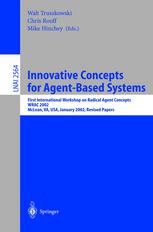

Most ebook files are in PDF format, so you can easily read them using various software such as Foxit Reader or directly on the Google Chrome browser.
Some ebook files are released by publishers in other formats such as .awz, .mobi, .epub, .fb2, etc. You may need to install specific software to read these formats on mobile/PC, such as Calibre.
Please read the tutorial at this link: https://ebookbell.com/faq
We offer FREE conversion to the popular formats you request; however, this may take some time. Therefore, right after payment, please email us, and we will try to provide the service as quickly as possible.
For some exceptional file formats or broken links (if any), please refrain from opening any disputes. Instead, email us first, and we will try to assist within a maximum of 6 hours.
EbookBell Team

4.0
56 reviewsThis collection represents the proceedings of the 1st GSFC/JPL Workshop on Radical Agent Concepts (WRAC), which was held on 16–18 January, 2002 at the Science Applications International Corporation (SAIC) Conference Center in McLean, VA, USA. Over the past few years, agent technologyhas emerged as a powerful force in computing. Agent technology may well form the foundation for the next gen- ation of computing systems. New and innovative agent concepts and techniques may bring further developments to this exploding area of research. Such work is often strongly inspired by theoretical or empirical studies of human behavior, social intelligence, psychology, arts, biology, computer science and philosophy. Thisworkshopaimedatbringingtogether,inaninterdisciplinaryevent,or- inal thinkers, practitioners and academics with an interest in radical (very - novative) concepts for agent-based systems. The workshop provided a forum to present the latest research?ndings in many aspects of agent technology. The - ganizers welcomed participation by those working in agent architectures, agent communities, agent communications, agent modeling, agent applications and other agent-related areas. We were particularly seeking papers on novel and - novative ideas, pushing the envelope of current agent technology. Contributions without a prototype or working system, i.e., purely conceptual contributions, were welcomed, and ”out-of-the-box” thinkers were especially encouraged to participate. The workshop was structured so as to allow the participants adequate time for discussion and interaction, to exchange ideas and re?ect on the motivations, scienti?c grounds and practical consequences of the concepts presented.